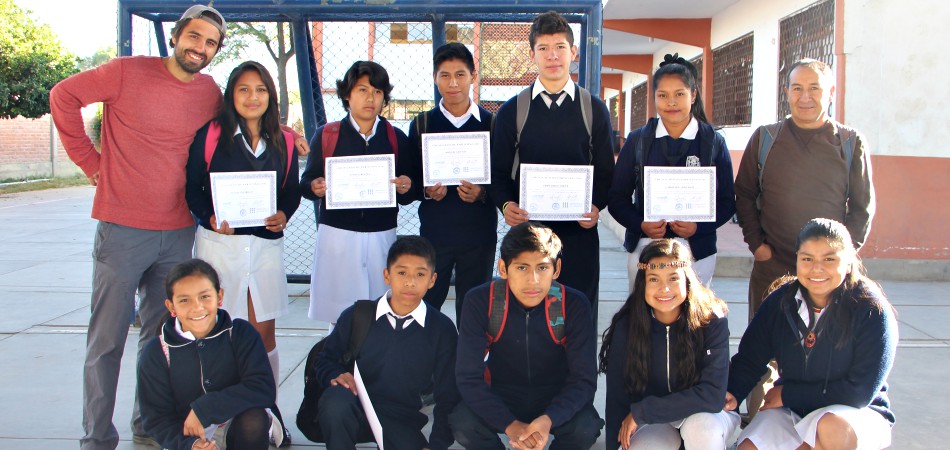This is the third in a four-part series about Democracy in Practice’s work replacing student elections with lotteries in schools in Bolivia. It speaks to students learning early about ways in which they can directly impact their own governments by participating in Deliberative Democracy, a key role in Building A New Reality.
In the first two parts of this series, I highlighted some of the problems with traditional student government, and explained the unexpected ways that using lotteries have challenged our assumptions about leadership and leadership potential.
Our organization, Democracy In Practice, has been helping schools in Bolivia reinvent civic education by replacing competitive student elections with voluntary lotteries. This gives every student, even those lacking the charisma and popularity to win an election, an equal chance to become a student representative and develop civic and leadership skills.
In this post, I want to share the way that lotteries lead to diverse and unexpected friendships.
A Curious Crew of Students
Unlike elections, lotteries don’t discriminate.
They don’t care about charisma or popularity, and they don’t respect cliques. As such, student governments selected by lottery are far more diverse and representative of the student population than those that are elected.
Moreover, we structure the lotteries in a way that ensures an even gender balance and a representation of different grade levels and classrooms.
The typical student government we work with has six girls and six guys, ranging from 12-18 years of age. They have a wide variety of traits, talents, personalities, interests, home lives, and grade point averages. There is almost always among their ranks a skilled athlete or two, a dancer, a musician, a voracious reader, a budding artist, and an avid gamer.
Fast Friends
It always amazes us how quickly these very different students, who would not typically associate with one another, become friends.
Pretty early into their semester-long terms of office, we see them hanging out together outside of student government, often countering strong norms whereby juniors and seniors rarely befriend sixth or seventh graders.
We see male and female representatives forge platonic friendships. The lottery brings them together and student government provides a cover from the teasing and gossip that often undermines such efforts.

I have had to silence the student government WhatsApp groups on my phone because they are constantly abuzz with a wide variety of teenage jokes, memes, and music videos.
Although their work primarily focuses on serious, school-wide initiatives, they seem most excited when organizing smaller after-school activities, just for student government members. So far, these have included potlucks, karaoke, soccer games, board games, a trip to the movies, and even a Saturday hiking trek into the nearby mountains.
Of course, not everyone gets along.
There are many disagreements and even occasional spats. But on the whole, it has been striking to see how tight their bonds become and how long these bonds last, which often persist years after their term of office together has ended.
Diversity is Key
Admittedly, it is difficult to definitively identify the key causes of these fast friendships.
It is true that many teenagers are innately curious and sociable. The experiences and achievements they share together certainly strengthen their bonds—as does the leveling effect of lotteries (which I will explore in the next post).
However, having also worked with elected student governments and with students in other contexts, it is pretty clear to me that diversity is a key factor. When I watch them interact, they seem to be attracted to the novelty of conversations and connections they don’t find in their cliques.

This all hit home for me recently, while looking through some video footage from past years.
I found a video with student representatives who were just finishing their term of office, in which I asked them what they liked most about the experience. Elvin, a sophomore, said it was “spending time together and making new friends.” Stefani, a junior, backed him up, saying that what she liked the most was getting to know new people. Everyone agreed.
I asked them if they had known each other before this experience, and they all shook their heads. Then Adriana, a freshman, summed it up by stating, “I liked that we made great friends. We found ourselves thrown together with people that we didn’t think we’d get along with.” And when I asked them if they would enter subsequent lotteries, after a chorus of yeses, Adriana turned to her teammates and added, “But we all have to enter together!”
I often tout public speaking and facilitation among the most important skills gained by students selected in student government lotteries. But in the end, for this next generation of citizens, the most important lessons might be the ones they enjoyed the most: learning how to get along with people who are different, and seeing how enriching those interactions can be.
Adam Cronkright is the co-founder and director of Democracy in Practice. The nonprofit focuses on reinventing student government and has worked primarily in schools in Bolivia. Democracy in Practice is part of a growing movement of democratic innovation that is challenging traditional approaches to governance all around the world.

